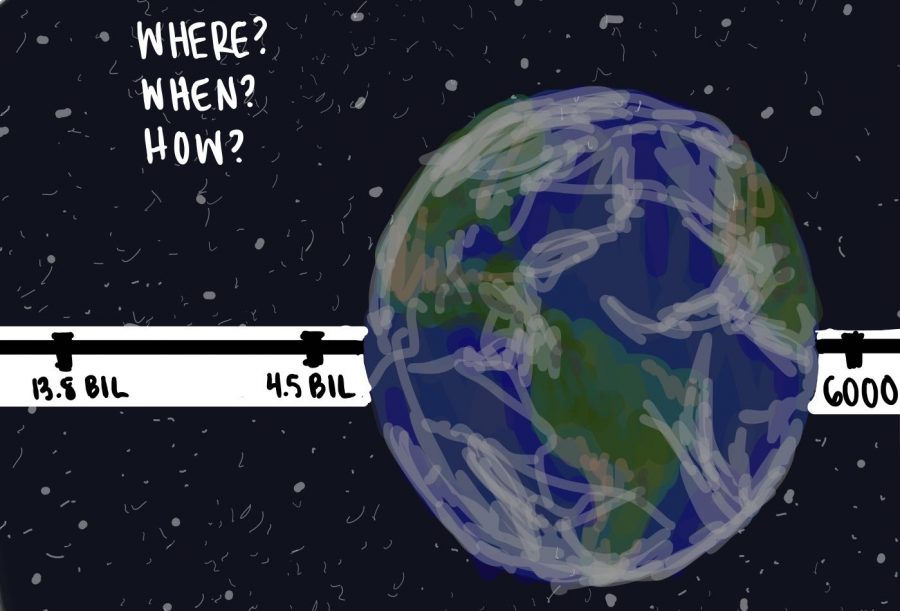The Creation Debate: Bias and Presupposition
How the church has failed to productively navigate the discussion of our origins.
How old is the earth? Did we evolve from monkeys? How did everything start?
Human beings have wrestled with such questions from the beginning. Throughout history, the church has clashed with the scientists of their age under the conviction that their empirically-based discoveries contradict the infallible Scriptures. From the heliocentrism vs. geocentrism debate to the three distinct interpretations of the biblical creation, the battle between the authority of the church and the secular emissaries of science and progress has persisted.
Oftentimes, however, as scientist Francis Collins points out in an invitation to rethink how Christians handle the discussion, “church leaders often seem to be out of step with new scientific findings, and run the risk of attacking scientific perspectives without fully understanding the facts” (The Language of God).
The basic arguments against the theory of evolution, for example, from a Christian perspective can be boiled down to the following: it’s not written in the Bible, it violates the principle of imago Dei, it’s scientists’ attempt to disprove Christianity, and how on earth can a monkey become a human?
The problem is these arguments offer an emotionally-charged, uninformed defense that fails to allow for a productive discussion of the issue, usually arising out of a misunderstanding of the actual opposing argument.
The concept of microevolution is universally accepted: that different breeds of an animal develop as a population adapts to its environment. But when it comes to macroevolution, red warning lights flash in the minds of many Christians who see the theory as a threat. Scientifically speaking, the general working definition of evolution is the change in allele frequencies within a population over time. In other words, any major shift in the percentage of individuals with a certain trait indicates that the population has evolved. Macroevolution is simply the same process as microevolution on a broader scale.
Thus, no, a monkey does not suddenly give birth to a human. Evolution is a process that requires years and years of gradual change in a population’s gene pool; the smallest unit that can evolve, therefore, is a population. The working theory is that homo sapiens and apes share a common ancestor whose populations diverged and evolved on their own to refine their own favored characteristics. Furthermore, genetic evidence suggests this common ancestry: consider that humans and primates both show a genetic mutation that makes them unable to synthesize vitamin C, even though their DNA contains the instructions to do so. This gene in other mammals still functions soundly, indicating that a “mutation event occurred in the common ancestor of these species, rendering all of their descendants unable to make vitamin C” (“Evidence for Evolution”).
Evolutionary creationists believe that God utilized this process to carry out His creation and magnify His glory. And after intensive study of the book of Genesis, researchers of the BioLogos organization infer that much of the Genesis narrative, while still holding total authority as the word of God, relies less on accurately relaying the facts of an event and more on pointing readers toward its comprehensive significance. While the flood may not have spanned across the entire globe, emphasis on the message of the story combined with the ancient Israelites’ knowledge of cosmology would explain the discrepancy between the Scriptural narrative account and the scientific perspective (“How should we interpret the Genesis flood account?”). They additionally offer the idea that Adam and Eve were chosen as representatives of the human race, the first homo sapiens to be endowed with the breath of God and take on His image (“Were Adam and Eve historical figures?”).
And this issue extends to all points of view; evolution is not the only targeted opinion. Any perspective on creation faces this unproductively argumentative opposition: old earth creationists reject the infallibility of Scripture, young earth creationists are stupidly uninformed, those who do not believe in evolution cannot accept change, and any opposing side fails to know the facts.
But at its core, Christianity cannot be threatened by science. God cannot be threatened by science. Sure, big names in the field of science may use their study in a way that removes Him from the picture. But true scientific discovery is merely the revelation of God’s marvelous work within His creation.
Whatever conclusion believers come to, they must beware of holding onto their argument instead of their Creator. Human beings do not possess the intellectual capacity nor authority to understand life’s toughest questions. Science is a beautiful endeavor, a responsibility we have been entrusted with as an exercise of our dominion. But who was there at the event of creation but God? How can we place our faith in the conclusions of Man, finite in his pursuit of knowledge?
As scientists, we are observers. Not those with all of the answers. “So let us together seek to reclaim the solid ground of an intellectually and spiritually satisfying synthesis of all great truths” (Collins 234).




